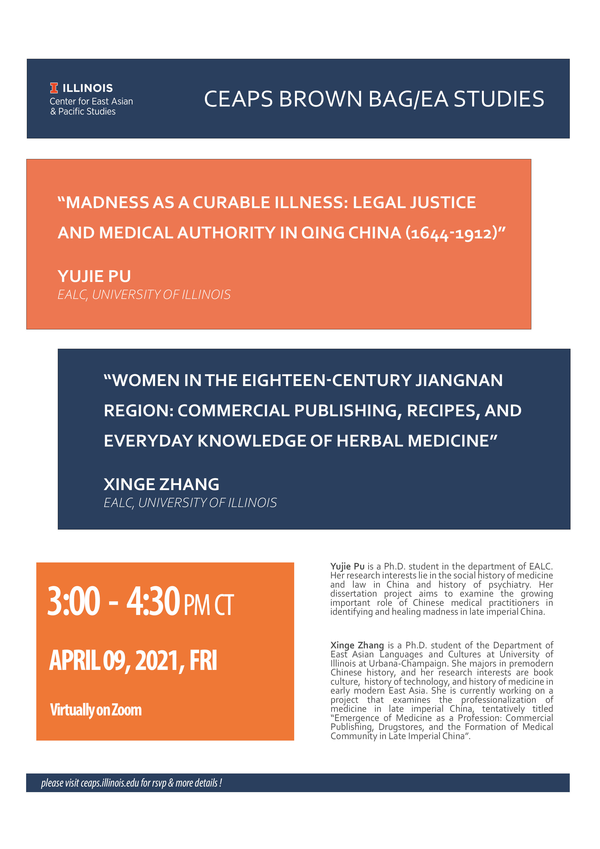Madness as a Curable Illness: Legal Justice and Medical Authority in Qing China (1644-1912) (by Yujie Pu)
“A murderer must repay with his life.” It was a basic principle of legal justice in Chinese history. My project examines how this entrenched view of justice was challenged when medical certification was legally required for homicide suspects suffering from insanity. Setting the question in a broader social context, my study also explores the professionalization of Chinese doctors and their role in the Qing legal system. Due to the imperial state’s growing dependence on doctors to recognize and treat homicide suspects’ madness, the Qing rulers in fact concurred with Chinese medical notions of insanity: Lunatics were not in control of themselves. This portrayal of criminal responsibility and insanity challenges previous depictions of madness in Qing China, which have tended to portray the regulation of the mentally ill as an institutional advancement in the wake of Western involvement. In contrast, this study argues that the new regulation of mental illness in the late Qing reforms was a culmination of imperial institutional innovations which cannot be understood without an appreciation for an increasing engagement of Chinese professional doctors in the juridical field since the mid-eighteenth century. Since the mid-eighteenth century, the imperial state depended increasingly on the authority of Chinese medical practitioners in the regulation of mad people. Beginning in 1667, in order to resolve problems arising from managing mad people, the Qing state began to create regulations, and these new sub-statutes called for medical assessments of mad people. Because of legal requirements, medical practitioners came to play a decisive role in the verification of recovery for lunatics in both home confinement and life imprisonment. Local officials began to rely on medical practitioners on their own initiative in the trials of mad suspects, and it became a sub-statute in 1806.
Yujie Pu is a Ph.D. student in the department of EALC. Her research interests lie in the social history of medicine and law in China and history of psychiatry. Her dissertation project aims to examine the growing important role of Chinese medical practitioners in identifying and healing madness in late imperial China.
Women in the Eighteen-Century Jiangnan Region: Commercial Publishing, Recipes, and Everyday Knowledge of Herbal Medicine (by Xinge Zhang)
Living now in a global pandemic, we are facing a wide range of challenges and changes. The state and medical institutions have launched a concerted effort to seek effective medical treatments and ward off the spread of the disease, in the meantime, they rallied cry for a greater attention to self-care practices in the household. One of these practices, as we may notice through media, is food therapy, in other words, cure diseases and nurture one’s life through everyday dietary treatment. This emphasis on daily diet, however, is anything but new. A correlation between food and medicine has been widely perceived and practiced by people in East Asia since the ancient time. To better appreciate this correlation and offer some insights into our contemporary practices, in this paper, I will look at women, who lived in the Yangtze Delta Region of China during the eighteenth century and came into contact with a local literatus Yuan Mei (1716-1798). I will argue that they contributed in a major way to produce and reproduce knowledge in the field of medicine through their daily practices of food and medicine. This paper is divided into three sections. The first section, aiming to provide a broader social context of women’s practices, analyzes the burgeoning corpus of publications on dietetic bencao and Master Thunder texts and the expansion of interest in the art of life cultivation in late Ming and Qing eras. The second section explores the participation of a number of elite and non-elite women in the collection and compilation of Yuan Mei’s cookbook, Suiyuan shidan (Recipes from the Sui Garden). The last section turns to Yuan Mei’s elite female disciples and examines gift exchange of food and herbal drugs between Yuan Mei and his female disciples as well as exchange between these women.
Xinge Zhang is a Ph.D. student of the Department of East Asian Languages and Cultures at University of Illinois at Urbana-Champaign. She majors in premodern Chinese history, and her research interests are book culture, history of technology, and history of medicine in early modern East Asia. She is currently working on a project that examines the professionalization of medicine in late imperial China, tentatively titled “Emergence of Medicine as a Profession: Commercial Publishing, Drugstores, and the Formation of Medical Community in Late Imperial China”.
